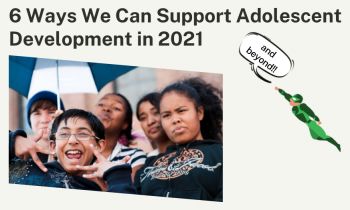Support from Parents & Other Caring Adults

5 Facts About the Importance of Caring Adults During Our Adolescent Years
During adolescence, we become less dependent on caregivers as we explore and expand our social worlds. But families and other caregivers continue to play a critical role in our healthy development. Secure and supportive relationships with parents and other supportive adults can help us build resilience, develop a positive sense of self, and navigate challenges. Circumstances that disrupt these connections can impact our health and wellbeing during adolescence and into adulthood.
Adults need to know that their support is still essential to helping youth thrive. Youth need programs and policies that build on the strengths of families facing challenges and ensure that all young people have a caring adult in their corner.
What the research says about the importance of parents and other caring adults during adolescence:
- Secure and supportive relationships with our parents and other caregivers during adolescence can promote wellbeing, prevent negative outcomes, and help us develop a clear sense of self and identity.
- Contributing to our family during adolescence can increase our feelings of belonging and happiness and help us avoid unhealthy risk taking.
- Strong family relationships have additional benefits for youth experiencing racism or other forms of discrimination. For youth of color, families can support positive racial and ethnic identity, and for LGBTQ youth, family support improves emotional and physical health.
- Mentors can play similarly positive roles for youth who experience homelessness or who are in the foster care system.
- As a society, we need to ensure that families and adult mentors have the social and economic support to maintain these critical relationships with youth.
As we mature during adolescence, exercising more responsibility and personal agency, we become less physically dependent on adult caregivers. Yet parents and other caring adults remain as important to our healthy development as when we were younger.
Research shows that relationships with our parents during adolescence affect both our physical and mental health. Secure and supportive relationships with our parents during adolescence can promote wellbeing, prevent negative outcomes, and help us develop a clear sense of self and identity. Positive parenting behaviors–caring, validating, affectionate, or humorous interactions–affect the growth of brain regions involved in processing rewards and helping us regulate our emotions.
We’re not only affected by what our families do for us, but also by how we contribute to our families. Contributing to the family can be an important source of belonging and identity. Helping our families can also increase our levels of happiness. A strong sense of obligation to our family also appears to alter brain regions involved in reward sensitivity and cognitive control in ways that can help us develop the skills and motivation to avoid unhealthy risk taking.
These positive relationships can look different, with different benefits and outcomes, among different social and cultural contexts. For example, young people from immigrant families or other heritage groups might have more of a sense of interdependence and family obligation than youth in non-immigrant families. Families of youth of color, and of Black youth in particular, may also be a primary source of racial and ethnic socialization, cultural pride, and preparation for facing racism and discrimination. LGBTQ youth who are accepted by their families have higher self-esteem, social support, and general health than those without supportive families. Natural mentors and other caring adults can play similarly positive roles, particularly for youth who experience homelessness or who are in the foster care system.
Because parents remain so important though the adolescent years, factors that disrupt these connections can have negative effects on our development. For example, youth placed in foster care have higher rates of anxiety, depression, and eating disorders as well as substance misuse than young people who did not enter the system.
Social inequities and biases can also interfere with positive family relationships, adding to stress in ways that affect the wellbeing of parents, in turn increasing depression and anxiety among youth.
Effective interventions can help reduce some of these challenges and bolster the essential connections we need. Research-informed, strength-based interventions that improve connections within families have been shown to improve mental health, and reduce substance use. In addition, youth in the foster system can benefit from programs that offer foster parents training to support traumatized youth and that help young people in the system stay connected with their families.
As adults, we need to work for policies and programs that help families and youth maintain the strong connections that are so essential for positive development.
What the research says about programs that support youth connections with parents and other caring adults:
- Adolescents continue to need strong relationships with parents or other caring adults.
- Programs and interventions can support positive development by strengthening family bonds and giving parents tools for communicating and engaging with youth effectively.
- Programs that connect young people with mentors can promote positive socioemotional, academic, and health outcomes.
- These programs are most effective when mentors share youths’ interests and are advocates for their goals and ambitions.
Parents and adult mentors play a vital role in our development and wellbeing during adolescence, when we’re discovering our interests and identities outside of our immediate family. Programs and interventions that seek to strengthen family bonds and provide opportunities for mentorship by caring adults can help us thrive and promote our positive development.
Strengthening Parent-Child Relationships
Supportive relationships with parents is a key component of positive youth development. Previous research has identified some common characteristics of parenting that can promote positive outcomes for youth, including warmth, school involvement, and appropriate levels of monitoring. Programs and interventions that promote these and other parenting skills can improve youths’ relationships with their parents and support positive development. For example, the Strong African American Families (SAAF) program is an intervention for rural black youth that focuses on strengthening family bonds and improving parenting skills such as reasonable boundaries and communication skills. Youth participating in SAAF showed reduced risky behaviors and their parents improved their parenting communication skills.
Other parenting programs for middle through high school youth, including one called Linking the Interests of Families and Teachers (LIFT), have been shown to be effective in reducing substance use. Follow-up analyses suggest that these results came from improvements in family problem solving skills. Family-centered interventions can also support adolescent mental and behavioral health, either by treating mental health issues or preventing future mental health risks. Different families have different needs, and family support programs appear to be most effective in supporting youth mental health when they provide families with multiple forms of support (such as informational support, emotional support, advocacy).
Parenting interventions can also promote positive academic outcomes for youth. The Family Check-Up (FCU) program, delivered to middle school aged-youth, involved youth and parents participating in family-strengthening sessions guided by a licensed therapist. Compared to youth who did not participate in the program, adolescents in FCU showed more stable academic outcomes into high school. Additionally, parenting interventions can also help support youths’ career goals. The Techbridges program for adolescent girls emphasizes the role of parents in promoting girls’ interest in science and provides resources for parents to incorporate STEM projects into family activities. Youth in the Techbridges program were more likely to feel they were good at science and show interest in a career in STEM.
Mentoring by Caring Adults
Other adults can also play a key role in youths’ learning, growth, and development. School-based mentorship programs have shown that meaningful and supportive relationships with adult figures can support students’ academic success and learning.
For example, the Big Brothers Big Sisters (BBBS) program pairs young people with adult mentors to support youths’ emotional and developmental needs, build resilience, and build meaningful and long-lasting youth-adult relationships. In the school-based program, youth and their mentors meet regularly to go over homework, do art projects, play games, or just talk. BBBS has shown numerous benefits, including better academic performance, greater confidence in academic abilities, and reduced likelihood to skip school or start using drugs.
Smaller mentoring programs, such as Virginia’s Young Women Leaders Program (YWLP) have also shown success in promoting wellbeing during adolescence. Girls experience higher risk for depression and low-self esteem during adolescence, and the YWLP program aimed to combat this by matching middle school girls with adult mentors to boost the girls’ competence, connection, and autonomy. Youth in the mentoring program had stable levels of self-esteem while the self-esteem of those in the comparison group declined throughout the school year. Overall, a review of formal mentoring programs for youth found positive benefits for adolescent development, including better academic performance, greater motivation, and fewer behavioral problems.
Importantly, mentoring can also occur outside of formal programs. Natural mentors–caring adults from youths’ existing social circles–can also help support positive development. Research suggests that having a natural mentor can support youths’ mental and physical health. Coaches, teachers, and neighbors can provide youth with guidance and support as they navigate adolescence. Programs that encourage natural mentors to be involved can benefit youth. For example, the National Guard Youth ChalleNGe Program (NGYCP), a residential program for youth who’ve dropped out of high school, uses natural mentors to support positive outcomes. Youth in NGYCP nominate an adult in their life, such as a teacher, neighbor, or church leader to receive training on how best to support the youth in their transition to adulthood. The mentoring program had positive effects on youths’ academic and career success, leading to higher earnings, longer employment, and greater likelihood of earning a GED.
- Big Brothers Big Sisters (BBBS) is a non-profit organization that facilitates meaningful mentoring relationships between youth and adult volunteers. Mentors and youth meet two to four times a month for at least one year for activities including reading, playing sports, listening to music, or talking about their thoughts and experiences. BBBS includes in-school mentoring programs as well as community-based mentoring to empower youth and strengthen communities. Analyses of the BBBS program have found substantial benefits for youth, including better academic performance, higher school attendance, and reduced substance use. Findings from the BBBS program show that fostering positive relationships with a caring, non-parental adult can support positive adolescent development. Additional research can look at how to sustain these benefits into late adolescence and adulthood.
- 4-H Mentoring: Youth and Families with Promise (4-H YFP) is a school and community program aimed at strengthening family ties and promoting positive development for at-risk youth through mentorship. Youth are referred to 4-H by school officials to improve their social skills or academics. The program matches youth with a formal mentor for social, recreational, and cultural activities. Youth can also interact with other caring adults in the 4-H club, to build their strengths, skills, and relationships. 4-H also hosts monthly Family Night Out activities to strengthen family bonds and improve communication between y
- Strong African American Families (SAAF) is a family-centered intervention for rural, black youth designed to strengthen adolescents’ relationships with their parents and prevent risky behavior. Through interactive games, discussions, and role playing activities, youth worked through topics such as setting goals, developing their sense of identity, understanding their values, and handling peer pressure. Parents completed separate sessions focused on developing communication skills and discussing ways to support their children’s development. Adolescents and their parents also attended joint sessions focused on working together, staying connected, and supporting youths’ goals. The program reduced risky sexual behavior, substance use, and behavioral problems, and increased positive racial identity. These findings suggest that interventions that strengthen the family may promote positive youth development and reduce health risks.
Additional Resources
Resources | March 30, 2022
5 Facts About the Importance of Caring Adults During Our Adolescent YearsResources | August 23, 2019
What the Science Tells Us About Parenting an AdolescentResources | August 29, 2019
Autonomy and Connection


